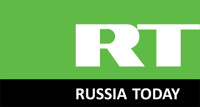
Interview of Jérémie Zimmermann on Russia Today’s TV channel.
Well, first of all it is a huge victory for citizenship, for democracy and for freedoms online. We’ve worked very hard for the last four years to achieve this and it’s the whole of the citizens of the Internet in a network global public sphere who achieved this victory. But as you say, this victory must be the beginning of something else and through the victory on ACTA, we hope that the EU policy makers will understand that this endless spiral of repression that is being pushed for the last 15 years by the entertainment industry has to stop, that combatting our cultural practices online is not an option and would only be done at the expense of our fundamental freedoms and of the very fabric of what is a free Internet. We have concrete proposals and they are already on the table of the EU policy makers about reforming copyright, about making our cultural practices legal, that sharing and remix of cultural goods be made legally into the law, so we can end this war against sharing. This is urgent and I hope that through the ACTA battle, the members of the European parliament understood. If you heard the yesterday’s debates, you heard members of all the groups, all the parties claiming that copyright has to change. So this is a signal that citizens sent through the Internet to policy makers. This is a symbol of global scale: it goes way beyond the borders of the European Union.
But the protesters, have they got a legitimate solution to this, this is the Internet we’re talking about?
Yes, well, the internet today is a global online public sphere. This is where people meet, this is where people discuss, this is where public opinion critalizes, this is where we can discuss concrete proposals as alternative to ill-founded policies. If you look on how ACTA was drafted, it was mostly a few US-based industries and a few unelected representatives who agreed together. What we can do all together in the open with a free decentralized universal Internet will be a much better quality, I can assure you.
As an advocate for cyber freedom, where do you think the line should be drawn where one person’s right becomes an infringement?
In copyright, you have this notion of fair use, in author’s right it’s called the limitations and exceptions, and those are parts where the artist doesn’t have his word. The author cannot, for instance, ban you from lending a book, cannot ban you from making a parody of his work, because lending books and parodies are of general interest. So what should govern policy making, is this notion of general interest. When it comes to filesharing online, you have dozens of independant studies including one from the French three-strikes authority, HADOPI, that prove that people who share the more files on the Internet are the peolple who spend the more for culture, the same way that people who borrow the more books in libraries are the peolple who buy more books. So, when we do filesharing between individuals and not for profit, it’s actually beneficial for culture because the more people access culture, the more cultural they get, end the more they like authors and artists, and the more they like them, the more they spend for them, to support them. So this practice of filesharing between individuals and not for profit is not only legitimate but it is beneficial for culture and for its economy, therefore for society as a whole. So sharing between individuals and not for profit must be made an exception to copyright. This is a very easy piece of legislation.
Certainly people are going to be arguing that ditching ACTA could be a green light for pirats and frauds to openly defy copyright law. Briefly what do you say to that argument ?
It’s the notion of copyright itself that should be revised. We all have the capacity today to participate in culture, to share, to rip, to remix. We all participate to culture and it is our fundamental right to participate in culture. It is article 27 of the Universal Declaration of Human Rights. We all have the rights to participate in culture and now we have the technology to do so. So it is copyright that should be adapted to society and not the other way around. And not through opaque anti-democratic processes through ACTA but within Parliaments with citizens being heard and I hope that the defeat of ACTA is the beginning of this.

